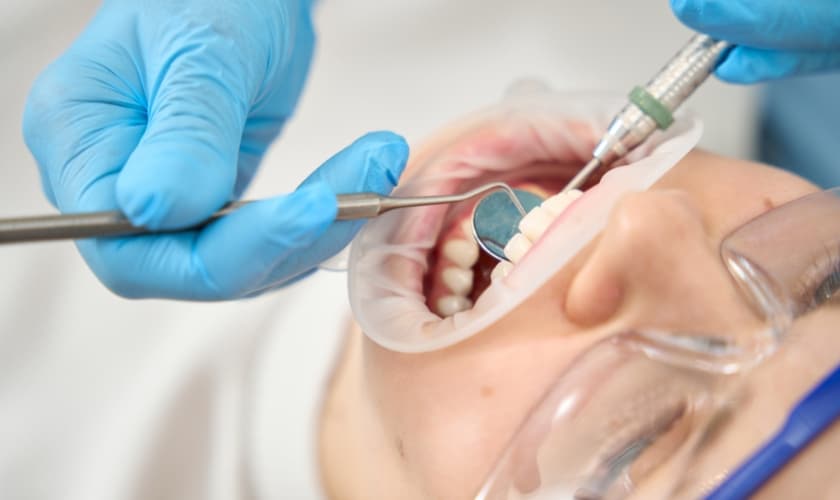Full-mouth dental implants can transform not just your smile, but your overall quality of life. However, this significant dental procedure requires careful consideration of several factors to ensure it’s the right choice for you. This comprehensive guide will walk you through everything you need to know before deciding on full-mouth dental implants, from understanding what they are to evaluating critical factors like oral health, cost, healing time, and more.
What Are Full-Mouth Dental Implants?
Full-mouth dental implants are a restorative dental solution designed to replace an entire set of upper or lower teeth. Unlike traditional dentures, which rest on the gums, dental implants are surgically anchored into the jawbone. This provides a more secure and permanent solution that closely mimics the function and appearance of natural teeth.
The process typically involves inserting several implant posts into the jawbone, which then support a full arch of prosthetic teeth. This method offers improved stability, comfort, and aesthetics compared to traditional dentures.
Factors To Consider Before Getting Dental Implants
1. State Of Your Oral Health
Before considering dental implants, it’s crucial to assess the overall state of your oral health. This includes the condition of your gums, jawbone, and remaining teeth (if any). Here’s what you need to consider:
- Gum Health: Healthy gums are essential for successful implantation. Gum disease or infections can complicate the process and lead to implant failure.
- Jawbone Density: Adequate jawbone density is necessary to support the implant posts. If your jawbone is too thin or weak, you might need a bone graft, which will add time and cost to your treatment.
- Overall Dental Hygiene: Maintaining good oral hygiene is vital. Poor dental hygiene can lead to infections, impacting the success of the implants.
2. Cost Of The Treatment
The cost of full-mouth dental implants can be significant and varies based on several factors, including the number of implants, the materials used, and the complexity of the procedure. Here are some aspects to consider
- Initial Consultation and Imaging: The initial stages often involve detailed imaging and consultations, which can add to the overall cost.
- Implant Surgery: The surgery itself, including anesthesia, can be costly.
- Prosthetic Teeth: The type of prosthetic teeth you choose (e.g., zirconia vs. acrylic) can influence the price.
- Additional Procedures: If you require bone grafts or sinus lifts, these procedures will add to the total cost.
- Insurance Coverage: Check with your insurance provider to see if any part of the procedure is covered.
3. Healing Time
Healing time is a critical factor to consider as it can affect your schedule and lifestyle. The process typically involves several stages, each with its own recovery period
- Post-Surgery Healing: Initial healing after the implant posts are placed can take a few weeks. During this time, you’ll need to follow specific care instructions to avoid complications.
- Osseointegration: This is the process where the jawbone grows around the implant posts, securing them in place. It can take several months.
- Final Placement: Once osseointegration is complete, the final prosthetic teeth are attached. This stage involves additional adjustments and fittings.
4. Check The Dentist’s Experience
Choosing an experienced dentist is crucial for the success of your dental implants. Here are some tips to ensure you find a qualified professional:
- Qualifications and Certifications: Ensure the dentist has the necessary training and certifications in implant dentistry.
- Experience: Ask about their experience with full-mouth implants specifically. More experience often correlates with better outcomes.
- Reviews and Testimonials: Look for reviews from previous patients. Positive feedback can provide insight into the dentist’s skills and patient care.
- Consultations: Schedule consultations with multiple dentists to discuss your case and treatment plan. This will help you feel confident in your choice.
5. Improve Your Dental Health First
Before undergoing full-mouth dental implant surgery, it’s essential to address any existing dental health issues. This might involve:
- Treating Gum Disease: If you have gum disease, it needs to be treated before implants can be placed.
- Tooth Extractions: Any remaining teeth that are damaged or decayed may need to be extracted.
- Improving Oral Hygiene: Develop a rigorous oral hygiene routine to ensure your mouth is as healthy as possible before surgery.
Maintain Good Oral Hygiene
Proper oral hygiene is crucial before, during, and after the implant process. This includes:
- Brushing twice a day with a soft-bristle toothbrush.
- Flossing daily to remove plaque and food particles.
- Using an antibacterial mouthwash to reduce the risk of infection.
Follow Post-Surgery Care Instructions
After your implant surgery, your dentist will provide specific care instructions. Following these closely can help prevent complications and ensure a smooth recovery. Common recommendations include:
Avoiding Hard And Chewy Foods That Could Stress The Implant Sites.
Using ice packs to reduce swelling.
Taking prescribed medications as directed.
Schedule Regular Follow-Up Visits
Regular check-ups are essential to monitor the healing process and the condition of your implants. Your dentist will schedule follow-up appointments to:
Eat A Balanced Diet
A balanced diet rich in vitamins and minerals supports overall health and aids in recovery. Focus on:
- Protein-rich foods to support tissue healing.
- Fruits and vegetables for vitamins and antioxidants.
- Calcium-rich foods to maintain bone health.
- Stay Hydrated
- Drinking plenty of water helps maintain oral health and supports the healing process. Staying hydrated can also reduce the risk of dry mouth, which can compromise oral hygiene.
Manage Expectations
Understanding the entire process and setting realistic expectations can help you mentally and emotionally prepare for your dental implant journey. Discuss the timeline, potential challenges, and expected outcomes with your dentist.
Deciding to get full-mouth dental implants is a significant step towards improving your oral health and quality of life. By carefully considering factors like your oral health, the cost of treatment, healing time, and the experience of your dentist, you can ensure a successful and satisfying outcome. Regular communication with your dentist and following their recommendations will further enhance the success of your dental implants.





